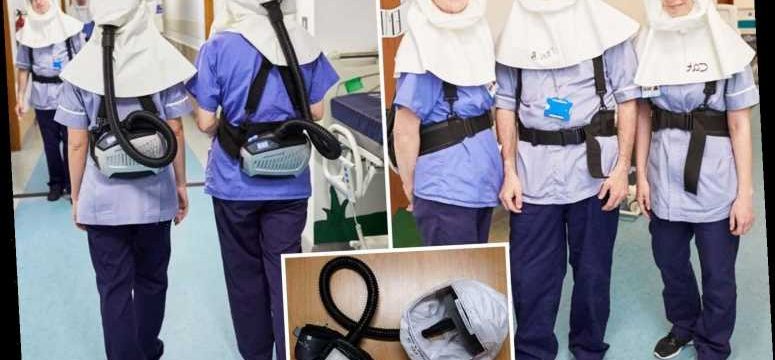MEDICS have been given the first protective respiratory visor hoods at a NHS hospital in the battle against coronavirus.
University Hospital Southampton introduced the hoods, which include a filter with belt-mounted fan pack, to help defend them in the battle against the bug.
⚠️ Read our coronavirus live blog for the latest news & updates
The equipment includes a fabric hood to cover the individual's head along with a plastic visor to protect their face.
It then pumps clean air through a filter that uses a fan mounted on a belt.
The new protective equipment – that can last for about nine hours and are reusable – comes amid concerns NHS workers are not being given the right protective gear to fight the bug.
Last week, doctors and nurses were asked to wear flimsy plastic aprons when full-length gowns ran out and reuse gear that is normally single-use only.
The move was a drastic U-turn to Public Health England's initial advice that the gowns should be worn for all high-risk hospital procedures.
And health authorities now hope the protective gear being worn at University Hospital Southampton could protect medics against the bug that has so far killed more than 18,000 people including at least 60 NHS medics.
Professor Paul Elkington, a consultant and professor in respiratory medicine in Southampton, initiated the study, saying: "Frontline medical staff are constantly at risk of being exposed to COVID-19 infection and personal protective equipment (PPE) has been a recurrent subject of debate through the pandemic.
"The aim is to minimise the risk of infection for medical staff and the engineering team have rapidly developed something simple yet effective which can provide further protection and resolve some of the supply chain issues associated with disposable PPE."
Designed by researchers at the University of Southampton and the NIHR Southampton Biomedical Research Centre in collaboration with clinicians at the University Hospital Southampton (UHS), the equipment was developed in a week before being trialled.
UHS – which has recorded 109 coronavirus fatalities – has now ordered 5,000 of the protective hoods.
Join our George Cross campaign for NHS staff
We are urging Sun readers to sign a petition calling for our NHS staff to be awarded the George Cross.
We are backing a proposal by Lord Ashcroft to honour our health heroes with the gallantry gong given for acts of bravery that did not take place in battle.
A No10 spokesman said: “The NHS is doing a fantastic job and the nation will want to find a way to say thank you when we have defeated this virus.” SAS hero Andy McNab added: “The award of a George Cross would show an emotional appreciation.”
We are asking our readers to please sign the petition below.
The new protective gear comes as the number of NHS workers killed by coronavirus nearly doubled from 32 to 61 in a week.
And paramedics pleaded for better PPE in the battle – revealing the aprons they are wearing are thinner than bin bags.
One North West Ambulance Service worker said: “If I was working in a sandwich shop I would get better protection. More of us will die if we don’t get proper gear.
“It’s just crap. The aprons rip when you get them out of the packet. They blow up in the wind over your face so your lower half is exposed. We are always snagging them on the side of the ambulance running to patients and have to tie up the holes. The masks don’t stop anything. You can blow a candle out through them. And the arm sleeves don’t cover anything.
“We are totally exposed. We have been in these since one week after the pandemic was declared. I think it will shock people to know how poorly protected we are."
The Royal College of Nursing said half of nursing staff, including those in the most high-risk environments, have felt pressured into working without proper PPE.
They are reusing kit, are short of alcohol rub and wearing eye protection they have bought or made at home.
Meanwhile a shipment of vital PPE equipment from Turkey finally arrived yesterday – but was only carrying half of the promised 40 tonnes of gear.
Source: Read Full Article













